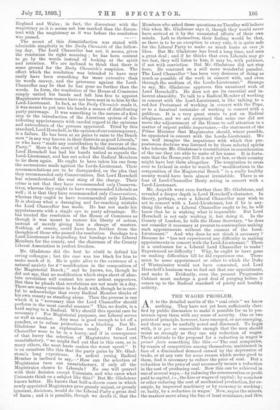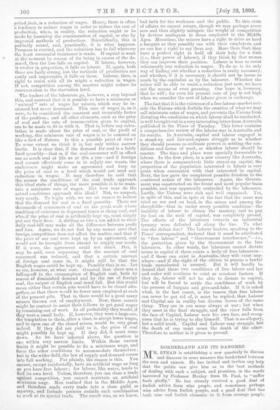THE WAGES PROBLEM.
AS to the detailed merits of the "coal crisis" we know nothing. They have not yet been sufficiently clari- fied by public discussion to make it possible for us to pro- nounce upon them with any sense of security. One or two points of principle, however, have emerged, or are emerging, and these may be usefully noted and discussed. To begin with, it is per se reasonable enough that the men should resist as strongly as they can any reduction of wages. Their attitude to the proposal for a reduction in wages is prima facie something like this The coal companies, i by reason of competition among themselves, maintained n face of a diminished demand caused by the depression of trade, or at any rate for some reason which seems good to them, find it necessary to reduce the price of coal. But a reduction in the price of coal necessarily means a reduction in the cost of producing coal. Now this can be achieved in one of several ways,—by reducing the remuneration or profit paid to capital, i.e., the hire or wages of capital ; by somehow or other reducing the cost of mechanical production, for ex- ample, by improved machinery or by economy in working ; or, lastly, by a reduction in wages.' Now, argue the miners, the masters move along the line of least resistance, and this, prima facie, is a reduction of wages. Hence, there is often a tendency to reduce wages in order to reduce the cost of production, when, in reality, the reduction ought to be made by lessening the remuneration of capital, or else by improved methods of production. Scientifically, this is perfectly sound, and, practically, it is what happens. Pressure is exerted, and the reduction has to fall wherever the least successful resistance is made. If capital is weak at the moment by reason of its being in excess of the de- mand, then the loss falls on capital. If labour, however, is weaker in proportion, it falls on labour. If, again, both these are fairly strong, but the methods of production are costly and improvable, it falls on them. Labour, then, is right to resist with all its might a reduction in wages. If not, competition among the masters might reduce its remuneration to the starvation level.
The leaders of the labourers go, however, a step beyond this, and contend that it is possible to have a minimum or "natural" rate of wages for miners, which may be in- creased but never decreased. This rate of wages is, as it were, to be considered the • constant and invariable factor of the problem ; and all other elements, such as the price of coal and the rate of remuneration given to capital, are to be made to fit in with it. That is, before any calcu- lation is made about the price of coal, or the profit of working, this minimum rate of wages is to be counted on like a fact of Nature. Is this a possible point of view ? To some extent we think it is, but only within narrow limits. It is clear that, if the demand for coal is a fairly fixed quantity—that is, if the coal-consumer will in effect use as much coal at 22s. as at 20s. a ton—and if foreign coal cannot effectively come in to sufwly our wants, the coalowners might make an agreement and keep up the price of coal to a level which would not need any reduction in wages: It may therefore be said that the nearer the conditions of the coal trade approach this ideal state of things, the more possible it is to main- tain a minimum rate of wages. But how near do the actual conditions approach this ideal,? Not, we suspect, very nearly. To begin with, we see no reason to believe that the demand for coal is a fixed quantity. There are thousands of consumers of coal on the great scale whose condition of existence in depressed times is cheap coal, and who, if the price of coal is artificially kept up, must simply put out their fires. A shilling or two a ton added to their daily coal-bill may make all the difference between profit and loss. Again, we do not feel by any means sure that foreign competition does not affect the matter, and that if the price of our coal were kept up by an agreement, coal would not be brought from abroad to supply our needs. If it were, the agreement could not stand. But, it may be said, even supposing that the amount of coal consumed was reduced, and that a certain amount of foreign coal came in, it might still be that the English wages could be kept up. Possibly that is so. Let us see, however, at what cost. Granted that there was a falling-off in the consumption of •English coal, both by reason of diminished demand and by the use of foreign coal, the output of English coal must fall. But this would mean either that certain pits would have to be closed alto- gether, or that there wauld be fewer men employed at each of the present pits. That is, there would be a good many miners thrown out of employment. Now, these miners might be content to assist their fellows to get good wages by remaining out of work. In all probability they would, if they were a small body. If, however, they were a large one, the temptation to them, after a time, to accept lower wages, and to open one of the closed mines, would be very great indeed, if they did not yield to it, the price of coal might possibly be kept up. If they did, it must come down. As we have inferred above, the question is one within very narrow limits. Within those narrow limits it might be possible to fix a minimum wage, and force the other conditions to accommodate themselves ; but in the wider field, the law of supply and demand comes into full working. Put plainly, the reason is this. You cannot, except incidentally, have an artificial wage as long as you have free labour ; for labour, like water, tends to find its own level. Unless, therefore, you can close a trade against competition, you cannot maintain an artificial minimum wage. Men realised that in the Middle Ages, and therefore made every trade into a close guild or mystery, and forbade persons outside each combination to work at its special trade. The result was, as we know, bad both for the workmen and the public. To this state of affairs we cannot return, though we may perhaps every now and then slightly mitigate the weight of competition by devices analogous to those employed in the Middle Ages. Meantime, the miners have a right to drive as hard a bargain as they possibly can with their employers, and no one has a right to say them nay. More than that, they have a perfect right to hold off their help for a time (i.e., their power of labour), if they think by that means they can improve their position. Labour is wise to resist vehemently any reduction in wages. To do so is its only way of finding out whether a reduction is really necessary, and whether, if it is necessary, it should not be borne as much by the capitalist as by the labourer. Whether the miner will be able to resist a reduction just now, we have not the means of even guessing. Our hope is, however, that he will ; for even his present rate of pay is not high when we consider the sort of labour given in exchange.
The fact that it is the existence of a free labour-market out- side the Unions which forbids the creation of what we may call minimum rates of wages, and prevents the Unions from dictating the conditions on which labour shall be conducted, is well brought out in a very interesting letter from Australia published in the Times of Tuesday. This letter contains a comprehensive review of the labour-war in Australia and its results. In Australia, capital and labour engaged in a stand-up and fair-and-square struggle as to whether they should possess co-ordinate powers in settling the con- ditions and terms of work, or whether labour should be master. The time and place were specially favourable to labour. In the first place, in a new country like Australia, where there is comparatively little stored-up capital, the proportion of the population interested in labour is very great when contrasted with that interested 'in capital. Next, the law gave the completest possible freedom to the combined action of the labourers. Again, the Govern- ment was constructed on the freest and most popular basis possible, and was apparently conlrolled by the labourers. Lastly, the Unions were rich and well organised. Yet, in spite of this, and in spite of the fact that the issue was tried on sea and on land, in the mines and among the sheepfolds—that is, under every possible condition—the inability of labour to obtain the mastery, and to put its foot on the neck of capita], was completely proved. The efforts of the labourers towards an industrial tyranny were defeated all along the line. To what was the defeat due ? The Labour leaders, speaking to the Times' correspondent, declared that it must be attributed to "free labour" and " Government interference—i.e., the protection given by the Government to the free labourers. In other words, the labourers cannot dictate terms to capital if there exists a body of free labourers— and if these can exist in Australia, they will exist any- where—and if the right of the citizen to pursue a lawful trade unmolested is secured. But it will hardly be denied that these two conditions of free labour and law and order will continue to exist as constant factors. If they do, labour will not be able to dictate to capital, but will he forced to settle the conditions of work by the process of bargain and give-and-take. If it is asked what, in the last resort, is the reason that free labour can never be got rid of, it must be replied, that Labour and Capital are in reality but diverse forms of the same thing. They are in one sense always at war ; but when they meet in the final struggle, and the vizor falls from the face of Capital, Labour sees his own face, and recog- nises that he is trying to slay himself. That is no allegory, but a solid truth, Capital and Labour may struggle, but the death of one must mean the death of the other. Therefore to neither is it given to prevail.



































 Previous page
Previous page